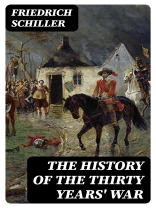Friedrich Schiller’s ‘The History of the Thirty Years’ War’ is a monumental study that delves into the complex socio-political and religious conflicts that ravaged Europe from 1618 to 1648. Written in a lyrical yet analytical style, Schiller blends dramatic narrative with historical rigor, employing an eloquent language that captures the tumult of war, the motivations of leaders, and the sufferings of common people. This work not only serves as a historical account but also as a philosophical reflection on the nature of humanity in times of strife, situating itself within the broader Romantic context that seeks to reconcile the ideals of freedom with the harsh realities of existence. Friedrich Schiller, a key figure in German literature and thought, found in the Thirty Years’ War a profound backdrop for exploring themes of heroism, conflict, and ethical dilemmas. His own experiences as a playwright and philosopher informed his historical writing, as he aimed to understand how deeply personal and communal struggles shape human destiny. His intention was not merely to chronicle events but to engage readers in a moral contemplation of the war’s implications for society and individual integrity. For readers interested in a compelling blend of history and philosophy, Schiller’s ‘The History of the Thirty Years’ War’ is an essential read. It not only illuminates a pivotal era of European history but also engages with timeless questions about the human condition, making it relevant for contemporary discussions on conflict, identity, and moral responsibility.
Про автора
Johann Christoph Friedrich von Schiller (1759-1805), known as Friedrich Schiller, was a towering figure in German literature, a playwright, poet, and historian who left an indelible mark on the world of letters. Schiller’s literary style was shaped by the ideals of the Enlightenment and the nascent Sturm und Drang movement, which sought to evoke emotional experience rather than adhere strictly to neoclassical formality. His contributions to historiography cannot be overlooked, particularly his detailed account in ‘The History of the Thirty Years’ War, ‘ a seminal work that provides a vivid narrative of one of Europe’s most devastating conflicts. This work exemplifies Schiller’s skill in entwining scholarly research with captivating storytelling, reflecting his belief that history should not only instruct but also inspire and engage the reader. As a historian, Schiller emphasized the influence of individual leaders and the psychological underpinnings of historical events, a methodology that foreshadowed later romantic approaches to historiography. His literary achievements, including plays such as ‘The Robbers, ‘ ‘Mary Stuart, ‘ ‘William Tell, ‘ and the ‘Wallenstein’ trilogy, continue to be celebrated for their embodiment of freedom and resistance against tyranny, themes that resonated deeply during his lifetime and which have since become universal. Schiller’s partnership with his contemporary, Johann Wolfgang von Goethe, further solidified his status as a pre-eminent intellectual, and their collaborative works are regarded as milestones in the canon of German classical literature.












